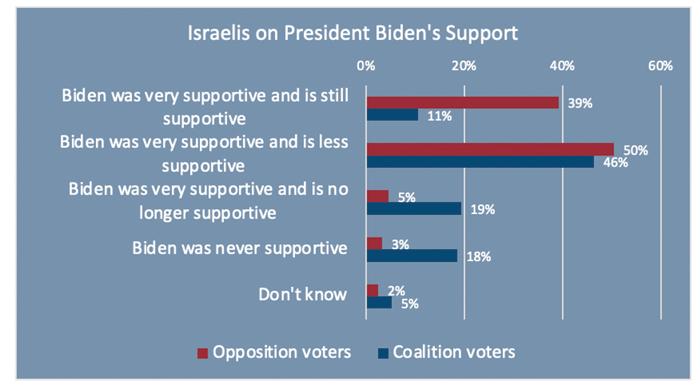
Let us begin with a harsh statement: President Joe Biden is hurting Israel’s efforts to win the war. He may be doing it for a good reason. He may be doing it for a bad reason. Perhaps he is sincerely concerned about the humanitarian situation in Gaza. Maybe his new tone has more to do with politics in America. One way or another — he harms the Israeli war effort. Biden makes it difficult for Israel to move to the next phase of fighting. Biden also raises the hopes of Israel’s enemies that the war will soon be over. In fact, that’s the more serious problem: It is quite possible that Biden is the reason for the hardening of Hamas’ positions in the hostage negotiations. He might be the reason why Hezbollah doesn’t hold its fire.
Let’s continue with a statement of frustration: Many Israelis are angry at Biden. That would be a natural response to his comments. But there is no benefit in being angry with the President of the United States. He does not work for Israel, and does not depend on its sympathy. Israel must deal with Biden with patience and wisdom, not anger. It has to try to understand what he wants. Biden says — and so does his vice president — that the U.S. still supports the main goals of the war. The U.S. continues to believe that Hamas rule in Gaza is unthinkable, and continues to demand that the hostages be returned. So one must ask: How does the U.S. propose to achieve these goals? Biden says that the price cannot be another “30,000 dead.” So, we know what he doesn’t want. But what does he want?
The Israelis are not dumb. Americans may be sold on the idea of winning the war in other ways but Israelis hear Biden and get a clear picture: His unwavering support has weakened. And he wasn’t even talking about winning the war. He was talking about dealing with Israel’s “trauma,” as if the issue is Israel’s psychological need for healing, and not a strategic need for victory.
Now let’s move on to a statement of principle: This is not the first time that the American government has tried to distinguish between the “Israeli government” and the “Israeli public.” Israelis, even those who do not support the Israeli government, must reject such sentiment. For good and bad, the Israeli government is the representative of the Israeli public. And the truth is that when it comes to the war effort, the Israeli government faithfully represents what the majority of the public wants. Yes, such paradoxes exist: the public doesn’t trust PM Netanyahu but it does support the war. And no – Senator Sanders – the IDF is not “Netanyahu’s war machine,” it is Israel’s army, supported by the public, manned by the public. If American leaders no longer want to support the war, that’s their choice, but let’s not let them pretend that it’s “Netanyahu” they disagree with, because its not him – it’s all of us, including those who vehemently oppose Netanyahu’s right-wing government.
Was Biden right to argue that Netanyahu does Israel more harm than good? Maybe. But if we sideline Netanyahu and replace him with Lapid, or Bennett, or Gantz, or Lieberman, or Israel Katz, or Yoav Galant — the Israeli war aim and war strategy will not change. Each of these individuals believes that Israel should enter Rafah. Each of these individuals believes that the IDF makes a reasonable effort to avoid harming innocents. Each of these individuals believes that Israel has no choice but to continue the fighting.
Therefore, it is possible to accept the claim that Netanyahu is “hurting Israel,” and at the same time disagree with the claim that the Israeli government does not represent the Israeli public. Israel is a democracy, and the Prime Minister of Israel represents the Israeli public. By the way, as far as we know, Biden represents the American people with an approval rating in America not much higher than Netanyahu’s approval rating in Israel.
If the Israeli public assumes that replacing Netanyahu means accepting U.S. demands, which means giving up victory, Netanyahu will not be weakened by Biden’s statements, he will be strengthened.
So, if Biden wants to hint that replacing Netanyahu will be good for them, he can do that. But in this case, his strategy is flawed. If the Israeli public assumes that replacing Netanyahu means accepting U.S. demands, which means giving up victory, Netanyahu will not be weakened by Biden’s statements, he will be strengthened. If Biden wants to help Israelis decide that Netanyahu should be pushed out of office, he needs to convince them that under another PM Israel’s chances of winning the war will be higher — not lower.
Something I wrote in Hebrew
Forty-five Israelis were killed in a Lag Baomer celebration on Mount Meron in 2021. Here’s what I wrote about the damning final report of the investigative committee about this incident:
Israel is not the first country to allow small groups within it to establish a kind of autonomy for themselves. The advantages are clear: Who has the power to deal with these strange people, who have strange customs and strange demands and strange language and strange clothes? Let them manage themselves, and we — the state — will handle them through proxies. But the disadvantages outweigh the advantages, especially when it comes to a group that is not small and is not marginal, and does not conduct itself in a low profile on the periphery of social reality. The state allowed the ultra-Orthodox leadership to establish a space free from supervision, and the result is noticeable. Careless, promiscuous, Byzantine management.
A week’s numbers
A JPPI survey found that Israelis by and large agree: President Biden is not supportive of Israel’s war effort as he was at the outset of the war.

A reader’s response:
Edith Rosenblum writes: “Shmuel, why are you writing so much about the Haredim?” My response: Because it’s important. The future of Israel depends on its ability to deal with this challenge.
Shmuel Rosner is senior political editor. For more analysis of Israeli and international politics, visit Rosner’s Domain at jewishjournal.com/rosnersdomain.























 More news and opinions than at a Shabbat dinner, right in your inbox.
More news and opinions than at a Shabbat dinner, right in your inbox.